
Biology
202
Neurobiology and Behavior
Spring 2005


| Biology
202 | 
|
The challenge in general
Review of Blink, NY Times Book Review, 16 January, 2005
The response in general
| Biology major? | 12 |
| Psychology major? | 8 |
| NBS concentrator? | 6 |
| Other majors | 28 |
| Undecided | |
| Satisfy science requirement | 9 |
| Interested in biology/nervous system? | 7 |
| Interested in psychology/behavior? | 4 |
| Interested in philosophy/nature of reality/human experience? | 9 |
Interested in practical problems? things in newspapers/magazines?
| |
| Want to understand who you are? why you/other people behave the way you/they do? What you/they can do about it? | |
Neurobiology and BEHAVIOR ... what is "behavior"?
NEUROBIOLOGY and behavior ... Neurobiology = study of the nervous system ... what is the "nervous system"?
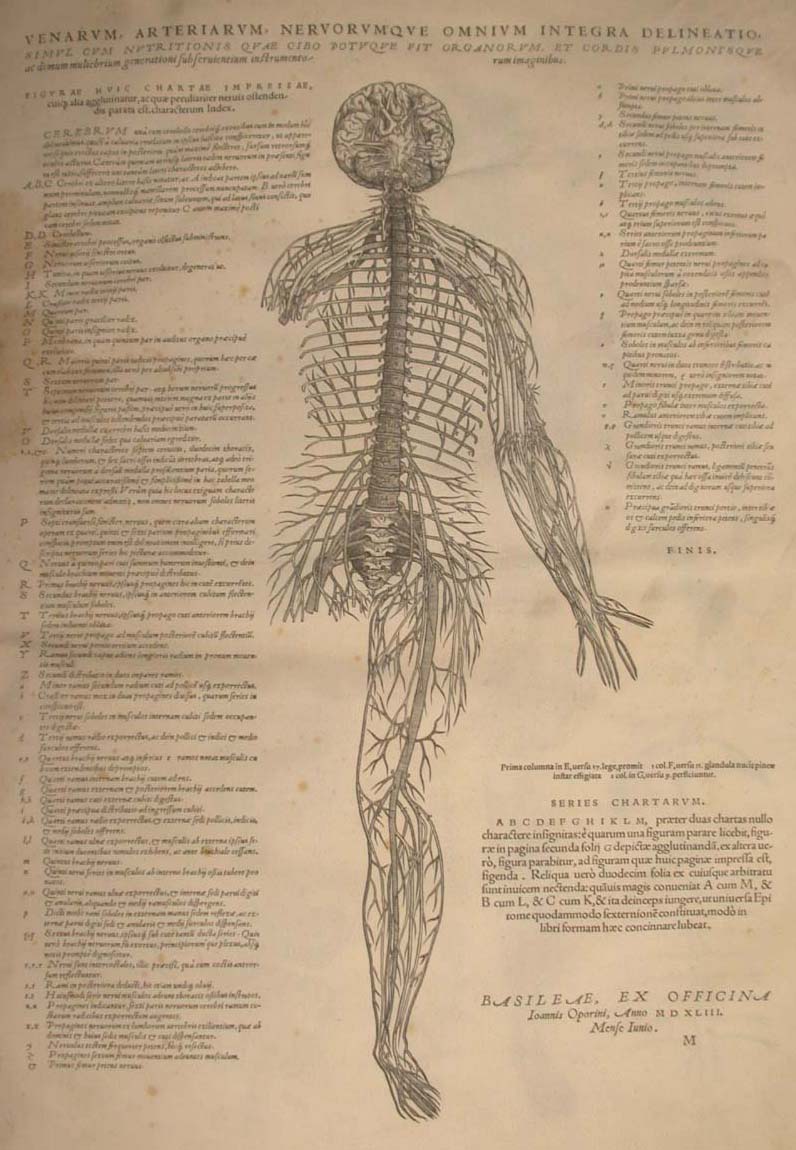
| Image by Andreas Vesalius (1514-1564), contemporary of Copernicus, suggested (less than 500 years ago) that nervous system rather than heart was origin of behavior (see Milestones in Neuroscience Research for a time line extending from 4,000 B.C.). | 
| Image by Rene Descartes (1596-1650). Set framework for several centuries (and continuing) discussion: mind and body distinct things or same thing? |
| Nervous system is material object, part of body, can be touched, manipulated, measured. What IS the relationship between brain (nervous system) and behavior (broadly defined to include human experience)? Subset of this are questions such as the relation between mind and brain, mind and body, matter and spirit, matter and form ... | |||
| Agree with Dickinson et al. | 18 |
| Disagree with Dickinson et al. | 4 |
| Unsure/fence-sitting | 12 |
|
Interesting issue about definition of "behavior" ... resistance to including internal states, eg emotion and thinking, on grounds that these are "mechanisms" responsible for behavior rather than behavior ... Interesting also that the notion of trying to infer internal states of others, as opposed to simply observing external action, seems to some more characteristic of females?
Possibly related news story (should have been included above): Are there genetic influences on brains that are different in different people? |
Brain = behavior?, from a "scientific" approach:
Issue is not "Truth" but whether there is a good "summary of observations", "working hypothesis", something that contributes to getting it continually "less wrong" is useful for the ongoing generation of new stories in science and in culture at large ...
Start with overview of the "trend of the evidence":
|
Science is ... "mechanistic", "separated", "objective", leaves out "creativity" is "group think" rather than individual thinking? On flip side, provides benefits of collective experience, wisdom, involves stories that can be falsified? Re Harvard President:
|
Forum area this weekend: YOUR thoughts on "brain=behavior", on science, on ... ?
|
Gray Matter and Sexes: A Gray Area Scientifically
|
Starting with what one thinks .... and getting used to/seeing the advantages of being wrong
|
In trying to define a scientific approach, I was reminded of an essay by Planck (~Meanings and limits of exact science: 1, 2) and the notion of paradigm shifts. If I understand correctly, he asserts that there is on one hand, the real and metaphysical world and then there is the world of "appearances" created by our senses, thus our picture of the world as we perceive it to be. The "real" world is hidden and not accessible because our world view/picture of the world is limited and has borders, it's never right or absolute. The goal of science is then to expand the frame of view and get closer and closer to the real/metaphysical world. I think Planck's example was something along the lines that Newton's theories of physics weren't necessarily wrong, they just weren't sufficient enough at the time, and Einstein's theories were more specific, explained more, and got closer to the 'real' answer (=less wrong than Newton). Anyway, in short, I like the idea of "getting it less wrong" but like to think of it rather in terms of "getting it more right" ... Laura Cyckowski "Is brain=behavior a good story? What's problematic about it?" I feel alot more comfortable now that the concept of truth has been thrown out the window and in its place we have our observations/theories/stories. Brain=behavior is a good story, but does it leave room for other stories to co-exist with it? ... Student Contributor Perhaps I ... simply prefer a less scientific story that would explain the complexity of human behavior and affirm the concept that behavior is "self"?-directed (vs. brain-directed). If I refuse to eat, for example, I starve my brain of glucose. The brain is likely to send signals to the body to obtain food. However, I think I could choose to ignore these physical drives and continue to abstain from food ... What is the origin of this overriding desire not to eat, a desire that may cause me to "disobey" the brain? ... Xuan-Shi Lim Going back to the example of refusal to eat, I think that the brain creates the sensation of hunger to try and obtain the basic food sources that it needs, however the decision to ignore this comes from a more advanced function of the brain ... Lauren Dockery In other classes, we have thought about behaviors as a product of both the brain and of the environment. I acknowledge the role of the brain in many of our behaviors; neurotransmitters correspond to specific functions (such as memory and mood) and may even be a code for "thought". The very fact that many of our pharmaceuticals are able to affect observable behaviors adds to the trend of evidence. But I also believe there is a place for the external, for the environment ... Joanna Scott Since experiences are stored in the memory, which is a function of a brain, is thought only a physical aspect which changes as the brain grows with memory? ... Flicka Michaels I was also wondering what the brain=behavior theory implies for the idea of free will. If thought is physical, do we have free will, or are we simply fated to respond in a chain of responses to the various stimuli that act upon us? ... Patrick Wetherille |
IF Emily is right:
How do we THINK the nervous system works, and how DOES the nervous system work? ... (What else must it be like if Emily et al
right)? ...
and a starting case, the cricket (Bentley and
Hoy, 1974)
Some starting points: a self awash in "chemicals" or a sphagetti bowl?
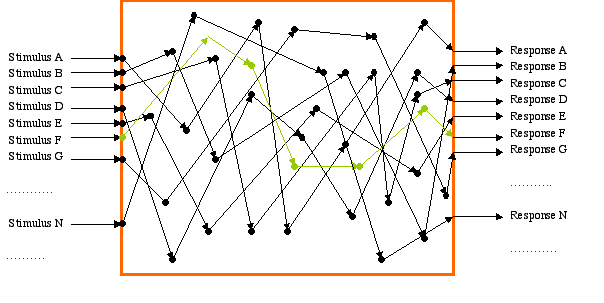
| Virtues
|
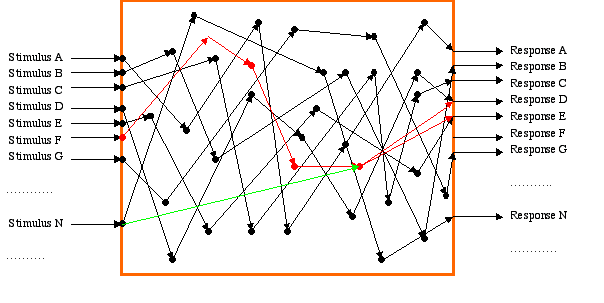
| Virtues
|
A rethinking - boxes in boxes
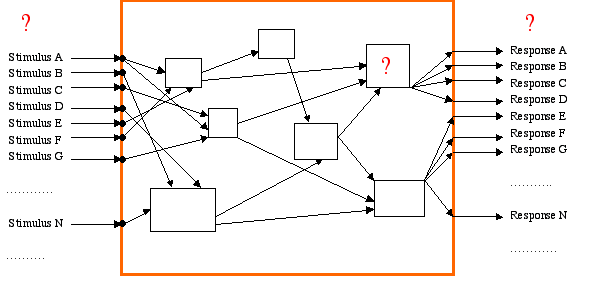
| Virtues
|
Facing up to the stereotopy, stimulus-response problem ... freeing the box from the outside world, adding autonomy
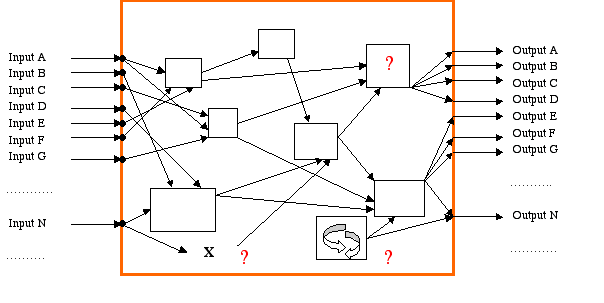
| Virtues
|
|
"getting it less wrong" vs "getting it more right" |
The "real" nervous system - an input/output box consisting of interconnected input/output boxes?

| 
|
| photo from Kemali and Braitenberg, Atlas of the Frog Brain, Springer-Verlag, 1969 |
Each box in turn (somewhat arbitrarily) subdividable into smaller boxes (with some differences among vertebrates, to return to)
And those ... yes, "its boxes all the way down"
The smallest box: neurons everywhere
Invertebrate nervous systems also have neurons, but differently arranged - makes sense?
Neuron as common, smallest box and as input/output element, connected to other boxes
Can use boxes->boxes ... ->boxes(neurons) to show that larger boxes interconnected, in relatively specific ways (anatomical specificity) and to rigorously specify "input" and "outputs" of largest box ... nervous system itself
|
After having a conversation with my identical twin sister last night and saw how different in regards to behavior we are, I realized that I can't possibly believe Emily's ideas. My thoughts are similar to Georgia's since she discussed identical twins in her post ... I always seemed to reason that my sister and I had similar interests because we were inherently the same ... Now that we're no longer in the same environment our interests and behaviors are strikingly different from one another. If I was to look at this from Emily's perspective then that must mean that my sister and I must have different brain compositions but science forces me to believe that this isn't the case ... Leslie Bentz I wholeheartedly believe in free will, possibly because I cannot accept that I have no control over what happens to me. I do not think, however, that I can overpower my brain because I AM my brain. I'm inclined to agree with Catherine that each box must make a "decision." But if the smallest box is a neuron, then the decision it makes is a result of the input messages it receives. If the messages it recieves is enough to set off the action potential then the neuron will fire. So where is the free will there? Just chemical reactions. Because free will cannot be proved to exist, however, does not prove its non-existence, as Patrick suggested. In our discussions of the scientific method, we asserted that nothing can be proven, only more observations can be made to support an idea/hypothesis/theory. I also think that the brain and mind are one. The restrictions of our mind put on by the brain as Imran suggested. The restrictions, I believe, are put on one part of the brain by another ... Amanda Davis free will, or freedom to choose by thinking about something, is really just a slow version of the brain reacting to a stimulus, in which the brain has enough time to send the inputs to our thoughts, instead of directly allowing the unconcious to cause an output behavior that is an immediate reaction ... Christine Lipuma what about non-tangible, non-spiritual factors that affect behavior? For example, peer pressure to conform to certain body images? If someone consciously/subconsciously conforms to an ideal presented by society, even if it is detrimental to one's health, is that an issue with the brain, society, one's will? ... Katherine Cheng Are there "memory cells" in the heart that could maybe explain why a heart transplant brought about behavioral changes, i.e. new hobbies and food preferences? How can this case-study be explained by the activity of the central nervous system? What about the unscientific explanation that the donor's heart carries some traces of the "soul"? ... Xuan-Shi Lim Angus Gellatly and Oscar Varate describe the difference between a "biological" and a "cultural" mind in their book entitled Introducing Mind and Brain. The mind is described as words that we use to explain/give a voice to thoughts and other cognitive functions. The mind can thus be seen as a societal/cultural construct ... "mind" was only invented once the society was literate. I definitely agree with the notion that mind and free will are social constructs ... Camilla Culler How can we prove that our brains have been changed by how we were nurtured/raised as children, and how different external stimuli have made us more inclined to have certain qualities/characteristics and behaviors rather than others? ... Jasmine Shafagh |
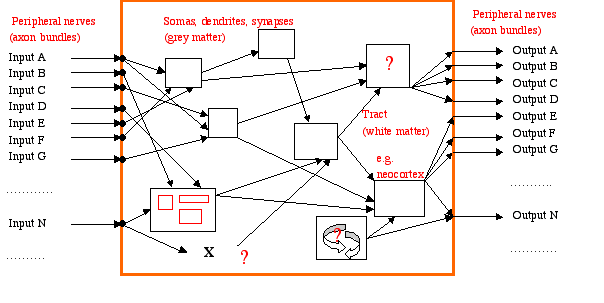
| Additions:
|
Go on to look at actual nervous systems to see if they satisfy expectations and to address issues ... further iterations ("getting it less wrong") to come?
The "real" nervous system - different if behavior different?
Outputs - topographic organization - anatomical specificity
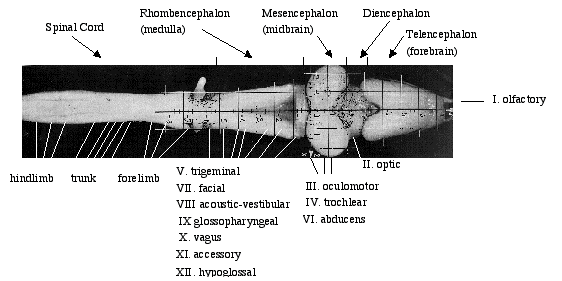
| For additional information: |
Observations "surprising", but have to be accepted - Issue is "how to make sense of them"
Two kinds of behavior ("reflex" versus something-else) intuition probably not useful
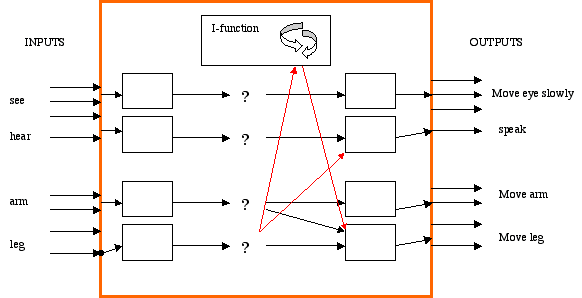
| Ascending somatosensory pathways |
|
I am still confused as to how the spinal cord could produce an output from an input without sending signals to the brain. I guess my question is how could the spinal cord also be a processing center? ... Shu-Zhen Kuang "processing center" = collection of interconnected neurons?) As a former ballet dancer, I know that my feet hated me on many occasions for continuing to dance on them despite blisters, cramps, and sprains. Yet I always felt that I could decide when to stop. I could decide how much pain I could tolerate. Apparently my spine has the last word on how I react at up to a certain threshold ... Beverley Burgess in the case of a serious injury my body has made it physically impossible for me to continue to dance ... I tried but there was an automatic response that jerked my foot up without me "telling" my foot to do so ... Lauren Dockery I personally have had an injury where some of my sensory neurons were severed so that I cannot feel anything on a region of my left leg. Because the neurons were completely severed, if I experience something akin to a "pinch," I do not pull away because no signal is even sent to the spine; I just don't feel it. Interestingly, though, I do occassionally experience what I believe is "phantom pain" (for lack of a better term) even though nothing was amputated. For me, it's kind of a weird tingling sensation that's actually sort of unpleasant. It happens at seemingly random moments, and doesn't happen all that often ... Catherine Barie maybe pain actually does originate in the brain ... Leslie Bentz all the discussion about pain being felt between the toe and the brain got me thinking about those monks that are able to transcend pain ... Are they battling against their brain's messages telling them that they are in pain ... Perhaps they are in a different area where the pain cannot get to, but then where would this be? ... Elizabeth Mobley Is there some part of the brain that is responsible for the body feeling whole, for the sense of self? It might very well be related to the higher processes such as consciousness. If so, I wonder how it relates to quadriplegia and the so-called inability to 'feel'. Do people experiencing these types of injuries still feel whole despite their loss of sensation on such a grand scale? ... Joanna Scott What we experienced as free will may be dependent on the coordination/communication between two systems (the brain and the spinal cord) and within the systems as well ... Xuan-Shi Lim I have a feeling that free will has a lot to do with consciousness. As the conscious part of our brain develops, I believe we begin to become aware that the actions we take are not the only actions we can take ... Flicka Michaels It seems that "choice" is becoming less and less coherent, while "will" is becoming more and more about communication between "boxes". What does all this imply about accountability? ... Georgia Griffin I simply mean to say that the physicality of the brain and the extent to which a person is evil by our society's moral standards must not be confused, and must be considered when we try to bestow justice upon everyone equally ... Jenna Rosania Because every mind is different and evaluates the world differently, there can be no distinct line from which to measure beliefs objectively. I think this is highlighted by a James Rachels quote that "If we assume that our ideas of right and wrong will be shared by all peoples at all times, we are merely naive" ... Liz Bitler I found it very interesting to learn just how efficiently arranged our neuro anatomy is ... In thinking about this, I could not help but think about the evolution of computers, for the two are very similar ... Patrick Wetherille How does another person affect one's brain? ... Amanda Davis I began wondering if like the compilation of story telling, the brain can be thought of as a sandpile as well. Similar to the social construction of "sharing stories", the brain has many individual parts, which make up a larger structure. Each neuron could be thought of as a grain of sand (or a story). Each grain of sand ... is not responsible for the whole pile, but contributes to the overall structure of the sandpile. Maybe in the discussion on Brain=Behavior, we should pay more attention to the actual role of the neuron ... Samantha Thompson I think we are overlooking the biological perpective a lot of the time in this class; focusing on many huge, unsolvable and labyrinth-like philosophical conundrums that could be greatly clarified if we stopped thinking about "what is the mind, and how do we know it" and looked instead at the obervable biological factors that define our behavior ... Beth Diamond |
Signals:
Action potential - longitudinal battery which appears/disappears successively at successive points along an axon ("travels" at finite speed), "all or nothing" transient (millisecond range) event
Recent news articles
Unusual number of unusually blank faces by end of class Tuesday ... ?
|
To understand action potential, need first to understand resting potential - transverse battery, continuously present, with potential for continuous variation
action potential: adjacent membrane regions with different transverse batteries (because of different selective permeabilities) - Issue then is how to get it to MOVE, with finite velocity?
Notice it is NOT matter moving, nor energy, it is a perturbation (signal, information)
And the big question ... can signals start in the middle of the box?
Yes
|
Going back to my analogy of computer development, I think it is interesting that the speed at which information travels has been continually getting faster in computers.
If a certain portion of an axon is particularly more permeable to sodium, therefore generating an action potential, then does it automatically fire all of the time due to random diffusion? ... If so, then is our behavior dependent upon diffusion? ... If not, then what is acting upon the axon membrane to change its permeability? If Emily is right and Brain=Behavior...
Then there is a possibility that given Diffusion=Brain, then Diffusion=Behavior. Personally, this idea, that Behavior is only a result of random diffusion, creeps me out a little bit ... How are we supposed to live with any kind of integrity if behavior is simply written off as a random event? Samantha Thomson
If randomness is introduced into the system, our explanation of behavior becomes less formulaic. We are not reduced to beings that simply respond to environmental events, but are generating inputs within ourselves and these inputs are the result of randomness. I am tempted to say this explains why our behaviors can be so complex and concepts like 'free will' and choice ... Joanna Scott We learnt on Thursday that signals can originate from the nervous system, and not necessarily in response to input from the external world. Could this be related to our experience of having a "self" that is separate from the brain? ... It takes a conscious effort for me to empty my mind of any thoughts even for 10 minutes; a moment of lapsed attention, I find myself "talking" to myself (in the mind). This gives an illusion that there is another me, an immaterial existence within me that operates largely beyond my control or that of my environment. Perhaps, it is the spontaneous activity of my neurons that makes it possible for me to have an internal conversation ... Xuan-Shi Lim I agree with Xuan-Shi and her ideas about an internal dialogue, or what we consider the "self", expressing itself as a result of interactions that do not necessarily deal with our brains or the environment, but that deal more with interactions that occur within the nervous system. In thinking about our anatomies in this way we allow ourselves to account for the many inherent differences that are prevalent in the human race ... Yinette Sano In thinking about action potential, the speed at which thought occurs struck me as significant. If thinking takes time (a finite speed), there seems to be limits to human capacity ... Going back to my analogy of computer development, I think it is interesting that the speed at which information travels has been continually getting faster in computers ... Patrick Wetherille I liked your idea about the: "speed at which information travels has been continually getting faster in computers. What might this say about human intelligence as compared to artificial intelligence." ... If a gazillion of these molecule sized computers could be strung together to create a sort of Super Computer, this could make humans obsolete, as it would contain so much information, and be capable of operating at lighting speed, that our brains simply cannot compete ... Anna Marciniak I'm wondering whether information processing is dramatically different for people with diseases such as Alzheimers or MS? I believe that reaction time is probably slower for people with these ailments because with a disease such as MS the myelin is broken down ... Anna Camilla Culler think we're loosing sight of the big picture. Altough a complete knowlege of neural networks and action potencials are essential to our understanding of behavior, I think we are trying to infer too much from it. Rather than taking the idea of randomness and trying apply it to such broad topics as our perception of free wiil , I think we should back track to the idea of a unique arrangement of these neurons to help explain these complex aspects of behavior ... Alredo Sklar I think it might be more effective for us to view the brain as separate parts ... Thus, maybe if we can learn how different parts of the brain function and how they relate to each other, then we can learn more about how each part affects specific aspects of behavior, and summarize what we've learned to try and understand behavior in general ... Flicka Michaels if the brain were constantly bombarded with signals, then perhaps there are "decisions" made as to which ones will or will not be ignored. But, since signals are "all or nothing" as Professor Grobstein mentioned in class, how is a signal terminated? ... Catherine Barie |
Have action potential, resting potential, spontaneous activity, based on ...
Need receptor potential, synaptic potential ... can do with one more idea/mechanism (not mystical): additional kinds of variable permeabilities.
|
Got threshhold but forgot to do conduction velocity, as example of the importance of threshhold What causes an action potential?
|
Input (sensory) signals - an example
Synaptic potentials - Synaptic integration
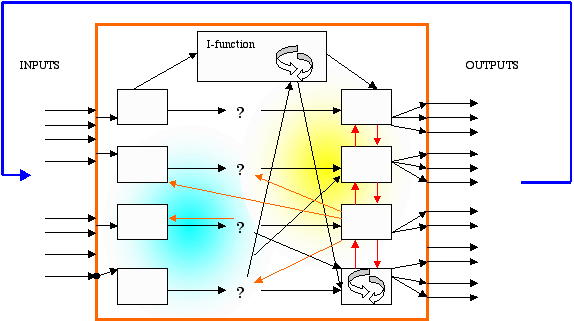
Seeing where we were, where we are ...

Problems solved, new issues raised ...
|
We also discussed this week the idea that our neurons might potentially fire involuntarily. To me, this seems like a very unappealing idea. Are we just clumps of cells put together that will randomly say and do certain things? ... Kristin Giamanco
What interested me most about the mechanisms by which boxes in the nervous system communicate with each other and with the rest of the body and the outside world, is that, biologically, our bodies are wired to react in the same exact way. If a neuron is stimulated in one body, the same stimulus should bring forth the same reaction in another neuron in another body. So if the nervous system communicated with each other and the rest of the body to ultimately react to the outside world, and we are all wired to react in the same way, what makes each individual possess different behavior? ... Lily Yoon At the end of class on Thursday, we touched on the receptors for chemicals located across the neuron. This brought to mind an observation that I've heard multiple times - that some people are more susceptible to chemical addictions than others. I'm wondering if there's a physiological difference underlying this, perhaps related to the number of chemical receptors an individual has on his/her neurons ... MK McGovern What looks more orange to one person could appear redder to me. Does this mean that there is no true "reality" by which to define our surroundings? ... Lauren Dockery We learned that at any one time, a neuron is bombarded by excitatory and inhibatory signals that it must process to decide whether to fire or not. I think (but I'm not sure)that we said that the spike initiation zone was responsible for this. Is this processing function localized in this one area at the beginning of the axon? If so, what special composition allows it to preform this job? ... Alfredo Sklar |
Have general ideas of units, rules of construction ... let's start building, see what we can get to connect the two levels?
Begin (non-traditionally) with output - "action"
Action = "motor symphony"
Accounting for motor symphony
| 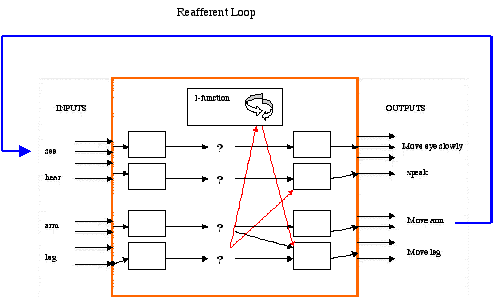
|
Trying to account for output patterns (motor symphony) confronts us with need to recognize larger phenomenon: nervous system is embedded in a loop, output creates input as well as input creating output. That itself raises some interesting issue:
|
Reafferent loop - exteroreceptors and proprioceptors
Looking more closely at the "central pattern generation" hypothesis
Implications of earthworm case
|
Learning how to dance can be thought of as creating a new motor score ...
This led me to think about how some people are "natural" dancers or musicians. We learned that usually, both genetics and environment play a role in configuring the circuits for movement. Does this mean that a baby born to a family whose members have been musicians for several generations is likely to have a pattern generator in place for playing musical instruments? ... Xuan-Shi Lim
since I was two and within the group of dancers at my studio there are some (with equal training, etc.) that are extremely talented and some that just can't seem to get the hang of it. Is this because their neurons connected in different sequences than those of the dancers that are very talented? ... Lauren Dockery Does the idea make sense that says, since when I was younger I never learned to ice skate or create the 'scores' which ice skaters use, I've missed a point where I could create the most accurate/precise scores, so that I could never ever become a professional ice skater? ... Laura Cyckowski might explain why children are more adept at learning languages, riding bikes, learning to swim, etc... their "motor symphonies" are not yet set in stone, still retain the ability to change. adults, on the other hand, have motor symphonies that are more set in their ways, resisting different arrangements ... Student Contributor Sacks relates one incident in which Temple gives him directions to her office. Midway, he interrupts her and asks her to repeat a certain part of the directions, but rather than clarifying the specific area of confusion, she must restart her complicated, detailed instructions, as if she were a tape deck. Given what we discussed today about the learning of motor patterns, I wonder how Temple's own process of learning and repeating information is related ... Katherine Cheng We discussed in class this week that children do not learn how to walk, instead they are already preprogrammed to do so ... I came across the idea that certain rituals and behaviors are preprogrammed into the brain of an individual with OCD ... When we use the word preprogramming, I think about the topic discussed in class concerning the differences and similarities between computers and human beings. Just as computers are hardwired to perform certain functions we as humans are too. Moreover, computers need to be stimulated or triggered to perform these events and humans need to as well. This seems like a very strange and somewhat disturbing parallel to me ... Kristin Gimanco it is highly incorrect to generalize that everyone is born with the same hardware, and that environment is the most important thing that makes behaviors variable among people. Examples of this are predispositions for alcoholism, non-functioning areas of the brain that lead to mental retardation and other behavioral disorders like ADD and ADHD, and people's natural talents in things which other people may never be able to attain success. Perhaps the point that environment is so important to brain development must be addressed, but not without the acknowledgment that brains are the way they are because of the variablity people are born with as well as the effects of environment ... Jenna Rosania Even before we were exposed to our environments, we all were still different. We come from many different racial and cultural backgrounds and our genetics are all different which make us function differently ... Malaya Sniezek In talking about the innate programming of such things as walking, where do critical periods fit in? ... Joanna Scott motor symphonies may be seen as predispositions to certain neral firing patterns that need to be developed rather than something tattooed in our brains from birth ... Alredo Sklar why does a memorized motor score become an unconscious habit? Is it because the signals sent by the score never reach the "I-function"? ... Flicka Michaels if I'm sitting in class I sometimes find myself tapping my foot. Could this just be another output from the same patterns? If so, it has implications about free will and whether or not I allow myself to walk in response to the "walking" firing pattern ... Liz Bitler behavior being used to generate input. I find myself frequently interacting with people in a trial-and-error way. When I first meet someone, I may be more reserved, and try out a few test jokes before letting out my entirely warped sense of humor. The level of reserve or formality I have with someone is generally based on small tests over time to see how alike we are, i.e. if our brains work the same way ... MK McGovern Science itself is the organization of behavior to generate inputs that give us better mastery of ourselves and our world ... Beverly Burgess I think the symphony analogy is terrific, since it implies that you, your consciousness is the conductor ... Patrick Wetherille
|
CPG from genome/experience/combination - is interconnected neurons
Location (back to crayfish)
Motor sympony lacks a conductor - coordinated performance of independent players (cf. Boids, fireflies) - efference copy = corollary discharge
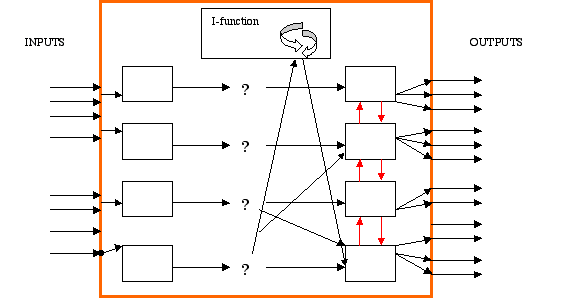
Look at some more uses/implications of corollary discharge:
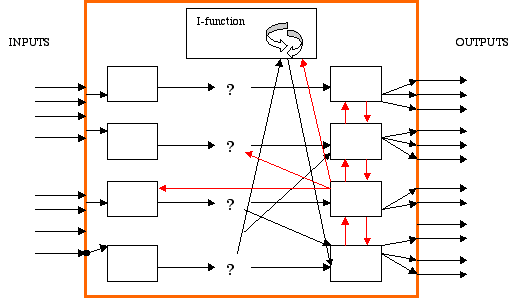
|
I think that science is suffering by ignoring genetic differences because of the societal impacts that may result from stereotyping ... Liz Bitler it is outrageous to propose genetic explanations on what is still a weak neurological understanding of the nature/nurture debate ... I agree that male and female brains are different, but to suggest that these differences account for female inferiorities in some fields is sexist (it is also unoriginal as women have been defending themselves from this suggestion since early feminists began writing in the Renaissance.) ... Kate Mattney environment, behavior, free will all play a role in determining certain characteristics of an individual, so how do we fit that in with our socially constructed notion of race? ... Kristin Giamanco because these genetic attributes are evolutionarily caused through environmental factors, these attributes will begin to change as peoples environments change ... Imran Siddigui Society craves order and classification and thus imposes strict means by which to categorize certain people ... it seems that these self imposed boundaries lack scientific/genetic merit. This got me thinking about the topic of genetic/cognitive similaritiy in general. In a society where cloning and stem cell research are creating advances in science that at one time were believed to be impossible why then are we still clinging to the archaic notion of "race"? ... Camilla Culler So the brain, previously compared to a computer, comprises a large number of integrated functional mechanisms, including learned mechanisms and programmed mechanisms like breathing, walking, eating ... Are behaviors culturally transmitted? Are all behaviors adaptive? ... Sophia Louis I'm left thinking that maybe we have less control over our behaviors than we would like to admit ... Leslie Bentz I wonder if a similar kind of internal signaling is also involved in keeping us from falling off our beds. I assume that we are afraid that babies would fall off their beds (so we keep them in cribs), but adults do not seem to have the problem. We unconsciously know when to stop rolling, regardless whether we sleep on a small or large bed ... Xuan-Shi Lim anna, i think your question "where does consciousness come from?" is a great one. it's one that i've been thinking about for a while. in a strange way, it's almost a cruel joke on the part of evolution - to select for humans with a heightened sense of awareness. it almost feels like having amnesia - one day humans found themselves on earth with no recollection of where they came from or who they are ... Student Contributor I wonder how we are to decipher what is reality and what is just a result of a vivid imagination ... Sonnet Loftus |
 |
Can account in terms of neurons for
Have still to account for
|
Have some useful "boxes"/concepts from thinking about output side in terms of possible origins of motor symphonies ... and some new questions
Output affects input ... input affects output?
Let's reinstate reafferent loop, see what new things that gets us
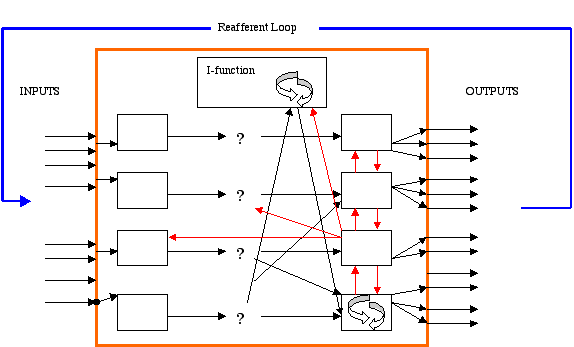
Stretch "reflex"
Not an input-output pathway but a feedback loop
Have motor symphony, central pattern generation, corollary discharge, "purpose", "choice" without I-function
What more from motor side?
Many more boxes/tracts relevant to output side of nervous system (alternate)
Cerebellum, basal ganglia as "loops"
Recapitulation:
 |  |
Lessons learned "from the output side":
|
In respect to the question of self-definition according to race or gender, I think it is very interesting that most of the class opted to relinquish race as an identifier but chose to keep gender. Carly points out that the sample population itself may be skewed ... "Gender," unlike race, implies specific physical capacities - child rearing for example - that "race" does not. While no reasonably informed person could legitimately argue that one "race" of people is better at singing operas or developing theorems, even a child acknowledges that females are (for the most part) capable of bearing children, while males can not ... Katherine Cheng
Just because you are located in a different area of the world, your brain adapts and changes because of it? I can understand that appearance may change due to external factors, but internal organs cannot change ... If one is to treat the brain like an organ (advanced thought it maybe), then I think one has to accept that it is a universal item that doesn't change from race to race ... I think I am still struggling with the issue of gender though, althought I am leaning towards factoring the difference into the differece in body type and the way the brain has to react and handle the difference ... Nadia Khan The theory "out of africa" contests that all humans came from the same "mother" from africa and that through time all humans moved about the earth and evolved into what we are today. If this theory is correct, is there a place for the concept of race to exist? ... Elizabeth Rickenbacher I disagree with what Katherine said above about race not inferring physical capabilities ... Laura Cyckowski I think that race is a more important distinction, specifically to non-Caucasian individuals ... Jasmine Shafagh About a week ago the athletes had a meeting with several high-ranking officials in the athletic deptartment and in the college in general, and someone asked the question: at one of the most racially diverse colleges in the country, why is every team here so predominantly white? It had never even occurred to me before, but when I think about it now, it does seem odd ... Bridgette Dolphin the point i'm trying to raise is: what does it mean to be female? what does it mean to be male? why do we assume that it is easy to define ... i would argue it is just as ambiguous as race ... Student Contributor I've been thinking a lot about what we discussed on Tuesday in regards to race and gender and I think that Sam is right: The way we should address diversity is to first acknowledge and accept the fact that we are all very different. Then, we need to be careful not to designate one group superior to another because that often happens in the effort to classify diversity and leads to problems ... I think there is sometimes a discrepancy between the way we define ourselves and the way others define us, and this is where problems in diversity arise ... Flicka Michaels There are clearly physiological differences between men and women, and even among people of different races, but how do we determine that functioning in one particular way is better than functioning in another? The relative values we place on different attributes are a construction, not the differences themselves ... In many ways this is similar to our perception of beauty; there is not anything inherently better about having almond shaped eyes, or full lips, but thousands of men and women undergo surgery to attain these characteristics because society has deemed them beautiful ... Georgia Griffin I think that what Alfredo brought up in a previous post, " the more one repeats a motion or set of motions, the more solidified the specific neural network responsible for this motion will become," is quite relevant. The more we are drilled with images of what is 'beautiful' or what it is to be 'white' or 'black', the more likely we are to find truth in these socially constructed classifications ... Sonett Loftus Making Sense of Diversity: A Conversation at Bryn Mawr College We talked about will, choice, and purpose with regards to our nervous system. This is a strange idea to me. I am tempted to argue that without thinking (and not any other form of processing) and/or consciousness, there can be no will, choice, or purpose ... "I" am longer the puppet-master tugging on the strings. Rather, I am the puppet who slowly becomes aware of the strings tugging at me ... Xuan-Shi Lim I found the definitions of will, choice, purpose, and anticipation very interesting, especially the question over the involvement of an internal experience associated with them. I've often found myself doing various tasks without really paying attention or having much of an internal experience of them. For example, I was getting myself a bowl of cereal, and I took the milk out of the fridge and poured it in the bowl, put the milk back, then decided I wanted a glass of water, reached in to get the water pitcher, poured a glass and carried my dishes to the table. When I went to take a sip of water, I found I had milk in the glass instead. Clearly there was some element of will, choice, and purpose in this task. I chose to have a glass of water, I willed myself to take the water pitcher out of the fridge for the purpose of pouring myself a glass. Yet somehow I managed to do this without having an internal experience associated with will, choice, or purpose, or I wouldn't have ended up with milk in my glass instead of water. What is the dividing line between actions that have an internal experience associated with them, and actions that do not? What triggers the nervous system to involve the I-function at certain points and not at others? ... MK McGovern |
Recapitulation:
 |  |
Lessons learned "from the output side":
Expectations of what will be learned "from the input side"?
Recall "labelled line" - see lightening, hear thunder because different neurons activated, send action potentials to different places
Vision as a paradigmatic case (is it? ... is at least best studied, and shows some general principals)
"Imaging" - essential role of non-neural structures
Picture on retina and picture in head very different
Look in more detail at retina and interconnections to get more idea of how much picture in head is "made up" ... and why
|
One thing I found very interesting was the discussion about the five senses. The concept that we do in fact contain receptors that we don't really know about or understand seemed to connect a lot of things together for me ... I am constantly asked if I can send messages to my twin sister, without talking to her, or if I know what she is thinking at any moment. My response is always that no, I cannot send her messages and or know what she is actually thinking. I always thought that twins, or really close family members/friends were just capable of guessing a friends reaction because they know them really well. But the idea that other receptors exist leads me to think that there might actually be a 'connection' between twins, even if they don't know about it ... Kara Gillich
I'm still pretty blown away by the evidence that the brain actually fills in what you see in the blind spot with something that is not there. I wonder if this effect is indicative of a more general tendancy of the brain to fill in the picture ... Patrick Wetherille Initially, the idea of our brain making things up without involving the I-function is neat. Now, I think the idea of our brain having the capability to make things up is a little scary. I relate this to schizophrenia, where patients experience delusions and hallucinations ... Xuan-Shi Lim I was intrigued with the lecture last Thursday. I always thought that reality is what we see and what you see is what you get. I was scared at the fact that our brain has the ability to make up the missing visions that the eyes can not detect. The one topic that got me really interested in the lecture is mind illusion ... Emily Trinh I find the discussion about the brain "filling in the gaps" very interesting. From my observations people not only fill in the gaps of their vision, but also their memories as Pat pointed out, and their understanding of things. People and their brains in general constantly make assumptions ... Imran Siddiqui It got me thinking about when I misplace my keys and search forever for them, and then they are actually right on my desk and I had been looking at them the whole time. I am wondering if maybe since I think that my keys are missing, my brain 'makes up' that they are not there. Therefore, even though they are sitting right there on the desk and I keep staring at them, I do not see them until after I have searched everywhere else ... When I was little during the spring time I loved to find caterpillers and butterflies outside and try to catch them, but whenever I went out looking for them, they were never there. I determined that if I purposefully went outside to find a butterfly, I would not find one. But if I went out to swing on the swing or purposefully NOT to find a butterfly, I would find one. So I would go outside saying to myself 'I am not looking for a butterfly'. I would swing on the swings and get distracted from thinking that I was looking for one, and then the next thing I knew, there was a butterfly on a flower right next to me ... Amy Venditti our non-I-function nervous system processes exist partly to shield our I-function from information overload. Like the way a parent shields a young child from too much stimulus. It almost makes the I-function seem like the least sophisticated part of the brain rather than the most ... MK McGovern I never really thought about how false memory played a role in terms of voluntary or involuntary memory. I certainly never thought about it in terms of the I-function. However, thinking about it now, I have to say that all three things are very important to take into account when dealing with the false memory phenomenon ... Elizabeth Madresh I find it very interesting how the brain can switch between reality and fantasy and how these two worlds are linked together in our daily lives ... Kristin Giamnaco In my family we always talked about being awake and going to sleep, not physically but mentally and emotionally. It was our way of calling the state of having an internal experience vs. not having one. Our discussion ... got me to thinking about whether I agree with the implicit judgment my family has on being asleep, or, similarly, Buddhist emphasis on the importance of being 'mindful'. Is it better to be thinking about what you're doing ... Kate Matney Wolfradt writes that, "Understanding deja vu could explain how the brain succeeds in producing a coherent likeness of reality." I was left wondering how do we differentiate between reality and this "coherent likeness of reality" created in the brain? ... Camilla Culler As Jasmine brought up, do our brains "make up" certain colors, or do we see them exactly the same way? Can we even know? ... Amelia Jordan We all see things differently, yes, they might have similarities but usually they are different. I like what Lauren Dockery said about the brain having being able to understand abstract ideas. I find that true and actually could explain maybe why our brains can make up the blind spots within our vision ... Malaya Sniezek I wonder what makes the brain confused at times ... Student Contributor |
Thinking about imaging/lateral inhibition/brightness implies:
How to guess well: using multiple perspectives ... to add depth
| Binocular stereopsis resolving conflict | But ... creating ambiguity |
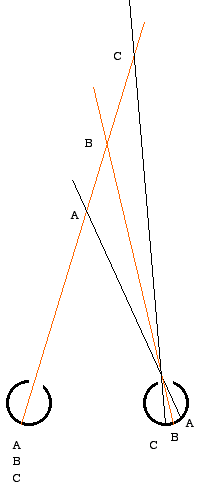 | 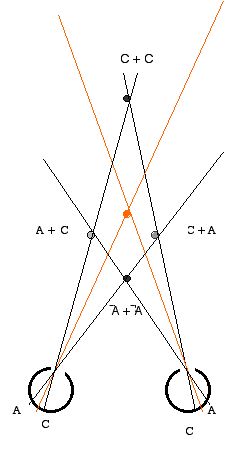 |
Better "picture" by making use of multiple perspectives, accepting/making use of "conflicts"
Ambiguity as fundamental in seeing, sensory systems generally
Can be reduced by using multiple cues, not eliminated (a "useful" gap?)
This is not yellow |
or
Is color an aspect of physical "reality" or "made up" by the nervous system?
Physical "reality"
|
I used to think that we only differ in our experience of social reality because we "interpret" situations differently. There are at least some aspects of physical reality which people can agree on... things such as the perception of color. Sure, there are people who are colorblind or blind but I always thought the deficit resides within these individuals and the physical world is "stable, independent, and unchanging" as Laura aptly describes. To learn that a leaf is not green in the absence of an observer challenges my idea of a stable universe. ... Xuan-Shi With the recent discussions about reality and perception, what I used to think of as "reality"-- something stable, independent, unchanging-- now seems more and more like a twilight zone that each of our brains and nervous systems are responsible for interpreting & making sense of in it's own unique way from person to person ... things now seem to be "more mind than matter" (color as just a perception, etc.) and at the same time "more matter than mind" (perceiving yellow from red/green light just being chemical signals that also happen to be the same for red/green separately, being filled in by our NS "without the I-function being conscious of it") ... Laura I think that the nervous system will not be able to handle all the inputs if we were to see the real "reality". Even if the nervous system can handle all the inputs, would we want that? It seems to me that the real "reality" will be very distracting and in the end produce more confusion than clarity ... Shu-Zhen I understand the nervous system is not doing a perfect job interpreting what true reality is, but under the circumstances, I think it is doing a great job ... Elizabeth By getting it less wrong we mean getting more of the whole picture. Isn't someone who sees more color distinction getting more input, more of the truth? ... Kate I don't think the stability of the universe depends on the way in which individuals perceive color. If a color-blind individual perceived an object to be gray, and a non-color-blind perceived that same object to be red, all that would mean is that they each read the world in different ways. And isn't that the key to existence? Not only a diversity in species, but a diversity in interpretations? ... Student Contributor I agree that diversity in interpretations is the key, but how to we embrace that when we don't realize in what ways our nervous system is "misleading" us? ... Laura while a colorblind person cannot experience the "feeling" of red, they know that a color "red" exists for others. They know what the name/label refers to, but have not had the "experience" of red ... Joanna so what is the right perception of reality? is there even this one reality we all live in? ... Sofya I believe that reality is largely a perception, and that there isn't a true or correct reality because it is different for everyone ... Catherine I thought for quite some time about anything in life that could be classified as never changing or static and I couldn't come up with a single instance of something that would always be "true reality". Any have any ideas? ... Leslie If perception is the reality for each individual, then does this must mean that there are an infinite number of ways of thinking about any one thing and so we are all "ignorant" all of the time unless we know everything? ... Christine So, if our concept of reality is based solely on the nervous system, is there any process by which humans can internally change the nervous system (i.e.- the brain) to change their view of reality? ... Flicka |
Lessons:
Reality always an hypothesis, checked and rechecked ... ?
Where IS "picture in head"? ... where/what is I-function?
Multiple ganglion cell types - more - multiple samples
Retinal projections ... another ... another
Moving on to neocortex
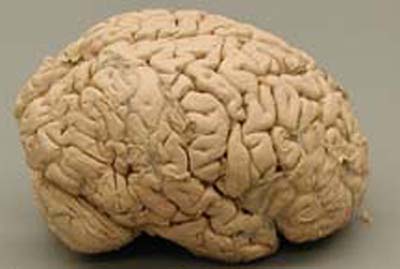 |
 |
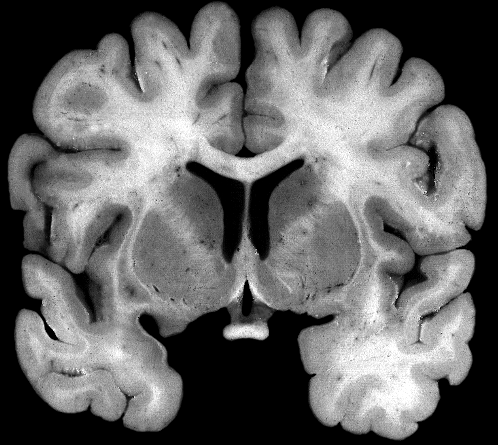 http://www9.biostr.washington.edu/DA-ATLASES/Neuroanatomy/gifs/Forebrain/Coronal%20Slabs/f60eb.gif | 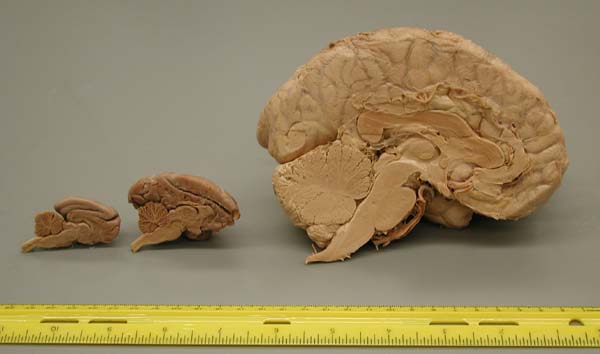 |
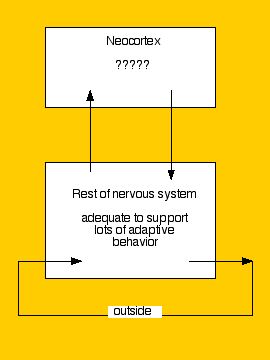 Visual Cortex - binocular convergence, altered "feature" detection, columnar organization, topographic organization
Visual Cortex - binocular convergence, altered "feature" detection, columnar organization, topographic organization
Blindsight and its implications - Don't NEED "picture in head"
 Lessons from sensory side ...
Lessons from sensory side ...
What haven't we talked about? Thoughts in forum?
|
he fact that we all have different perspectives and can't always agree on what is realy out there does not detract from the idea that there is one reality, it just means that devises for perceiving reality are not perfect ... Alfredo
Today I had an interesting experience and found myself thinking once again about reality and the discussions had in class. I was picking something up from the ground and while standing up, I hit my head (pretty hard I might add) on the shelf hanging above. The usual happened (the clenching of the eyes and the taste of pain) however, this time when I opened my eyes and saw the stars that follow hitting ones head I did not understand where the "stars" were coming from. They gradually disappeared, but it was quite disturbing having no control over what my body was trying to do. I took the stars I was seeing as a stop sign of sorts telling me to slow down to pay more attention. Is this the bodies way of telling me to be careful? Who/what is looking after me? ... Elizabeth Although I previously would have liked to think that there is a single bigger reality out there, our discussions have led me to believe that reality is actually very individualistic ... Essentially I am coming to the conclusion that most of what we perceive as reality are concepts that are entirely human constructs ... Lauren it might not even matter if there IS "one true reality." Indeed, if everything we know about the world is from research done by human beings, and human beings are by nature biased (in that we interpret things differently), how can we be sure that any piece of information is actually "true?" If reality is only based on individuals' perceptions, and some people perceive things differently, even if only slightly, it seems reality is really more fluid than concrete, and how possible is it that it's all in our heads? ... Carly After tuesday's class, i concluded that it is important to me to find that "one true reality". I can't be comfortable with the notion that each person gets to choose his/her own reality because this poses a problem for me when thinking about certain mental diseases like schizophrenia and depression. If we accept everyone's reality as true and acceptable, what makes a schizophrenic's reality any less right than our's? Why is there a need to treat it? Also, a depressed person has a very negative outlook on life, and some argue that they have the ability to be more "realistic" while others are just in denial ... Lily The things that we've been learning lately in this class have made us all question our beliefs about reality, but all of these examples also make an interesting case for social beliefs as well. Really, what does make a schizophrenic's reality any less valid than my own? We've already conceded that there is no way for us to know what is really going on out there, so what makes us so secure in our judgments about other people's perceptions of reality? I don't mean that we should just adopt an "anything goes" attitude, for that would obviously have negative implications (i.e. in terms of human rights issues, for example genocide, etc). I only mean that we should reevaluate our stance. Why is there so much more (not complete mind you) respect for people who claim to be psychic or telepathic than there is for people diagnosed with schizophrenia? What REALLY is the difference between the two? ... Georgia I also believe that the notion of reality has to be somewhat of a social construct, because who can actually and accurately define what is true to the billions of individuals and what is fantasy. The lines between these two worlds are internalized and each person must make the determination as to what is real and what is fantasy for them. Some individuals operate entirely in the "real world" while others have trouble distinguishing what is real and what is fantasy. The reason these latter individuals have this problem is because there is no true reality and no true fantasy it instead is all about perceptions ... Kristin Originally I had been one of the people who believed there could only be one true reality. I thought the dichotomy between a colorblind person and someone who isn't, instantly made the non colorblind person "less wrong". I had always been taught that there was right and there was wrong - there were no shades of gray in the middle ... I wanted to believe that if a majority of people saw a situation in the same way that it must in fact but the reality. But it was Elizabeth Mobley's post that made me think about why the majority always has to be right. We only looked at perception of colors but this whole idea of perception can be universally applied to anything ... I began to question the view of history that had been presented to me in so many past history classes ... Elizabeth made me realize that there must be shades of gray ... Leslie The philosopher Camus believed that humans create meaning and project it onto a neutral world. In our discussion about reality I got to thinking about this idea and decided that maybe reality is something we create to make meaning from an impartial world ... Kate I suppose that many people feel that there is one "reality" out there, no matter what the differences in our perceptions may be, perhaps due to Plato's story about the cave and the image of the perfect forms. Since the idea has been around for millenia, then it would make sense that most people hold this idea in some way or another. What I want to question is why people hold onto this belief? ... Elizabeth My brain is making up color, it's filling in information that my retina isn't actually recieving, and most of my nervous system is concerned with itself, not the outside world. I do, however, think that there is a reality out there. I believe this because of evolution. Natural selection is a process that selects individuals based on how adapted they are to their environment. No matter how they percieve their environment, animals cannot make their up. For example, finches with beaks too small to crack a certain year's seed growth will not produce viable offspring. No matter what those seeds look like or feel like to those finches, they won't be able to crack them if their beaks aren't the right size with enough power. The world exists, it's real, individual perceptions of it just may vary ... Amanda While there does seem to be an "agreement" as to what is "normal" reality within society, I think that reality is different for each individual. It is a rationalization, an attempt to create order so that input and be quickly categorized and interpreted in order to allow the individual to function in a manner that is conducive to survival. And so, this is where I think the I-function fits in. It is a "mechanism" by which information can be analyzed and interpreted so that the individual is better equipped to survive ... Catherine Also, while lots of people have said that the I-function may have evolved for survival, it seems it can, like parasites, have a detrimental affect on the nervous system; while the I-function doesn't seem to be able to override the nervous system in all cases (the example of a stroke patient moving a seemingly paralyzed arm in response to a beach ball), it seems to be what can make choices and exert will power, which sometimes might go against the body's/nervous system's purpose of survival, ex choosing not to eat, etc ... Laura One of the questions asked in class this week about the difference between internal experience and knowledge really struck me. Previously I had considered these to be synonymous in a somewhat naive way, but it's interesting to think about how the brain is able to experience something, and yet know that it's not real. Like when I'm camping out, I check the tent carefully for bugs before I go to sleep, so when I close my eyes, if I feel something crawling on me, I know it's just my imagination ... It's almost as if the I-function is capable of using past experience to overcome the inputs from the rest of the nervous system. This seems to contradict the notion of the I-function as being "along for the ride" while the rest of the nervous system is really running the show ... Laura The question was posed at the end of class today, why do we have an I-function since so much is done without it and other animals get along fine without it? One answer I'd like to pose is for reproductive purposes. Of course, countless other organisms reproduce without an I-function. As hominids were evolving, our brains progressively got larger and our offspring required more energy to raise. Possibly the latter followed the former or vise versa, I don't really know, I don't know if it matters. Our neocortex allows us to form more intimate relationships with other people than I believe other animals can with each other ... Amanda Maybe organisms without a neocortex just react to stimulus while humans think about what reaction they want to give and the consequences of each reaction. Since humans are not the only organisms with a neocortex, does this mean that other organisms with this structure may also have an I-function? ... Shu-Zhen I am guessing that the I-function is what makes us capable of distinguishing between our "self" and other selves (of the same species). This may be important for survival because we are social beings. Thus, we need to be able to separate our motives/intentions from that of others and figure out the motives/intentions of other others (versus self). In a more general sense, our I-function allows us to make sense of our surroundings by enabling us to draw connections among things (cause-effect relation), and enabling us to anticipate the consequences for events which may or may not have already happened. Perhaps the nervous system takes care of responding to changes in our environment but the I-function enables us to make predictions about what would happen in the future ... Xuan-Shi For me, the "I-function" represents consciousness. It is the ability for us to take ourselves out of context for a moment, and consider our lives from a different perspective. It is the ability for us to question ideas, learn new things, and grow as individuals. So, if humans did not have an "I-function", they would just be robots. Without the ability to do all of the things listed above, not only would we lack the ability to think, but we would lack the ability to change individually ... Flicka In many ways it seems that the I-Function really allows us to be unique individuals, and to still stay in touch with the collective reality ... Camilla it makes sense to now think of the I function as the part of the nervous system that is keeping us whole, and maintains all the multiples realities we experience and combines them into one cohesive existence ... Kara how crucial of a role does the I-function play in distinguishing us as individuals? If we did away with it somehow, how would we internalize our reactions to different situations and conditions? Or would we just walk through life without really thinking and processing information? Is this how some animals operate? It seems the I-function is crucial not only to our society, but the individuals that inhabit this society and I could not imagine if we had no I-function ... Kristin |

"generalized control mechanisms"
Personality - aspects of behavior/internal experience that are relatively resistant to change either environmentally or by I-function?
Self - ongoing dynamic interplay of unconscious and story-teller?
 |
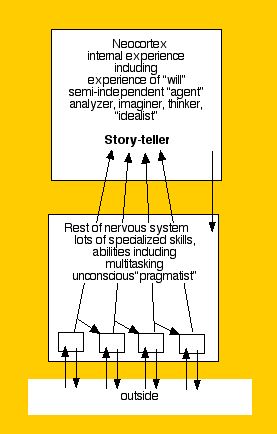 |
| Need to come back to this as well as to creativity |
 |
 |
Emotion as an experience resulting from non I-function activity Not only "reality" but emotions and "self" can be experienced semi-independent of input/output What is "experiencing"? How does it relate to what is going on in the rest of the nervous system? The I-function=neocortex=story teller? |
|
Today in lecture we started talking a little bit about emotions and the notion of self ... I feel as if these two phenomena fit into our notion of reality in a very different way ... I am pretty much convinced that there is no one "Ultimate Reality" ... With this in mind I believe that the closest one can get to defining a true reality is with the notions of self and emotion. To me, self is my true being...my true state of existence; and emotion is the fuel that drives my very existence. Since I am ever-changing (as is everyone) no single reality actually exists, but at any moment in time reality can be loosely defined as my personal notion of self and the emotions motivating my self in that particular instant ... Sam
I am interested in learning how humans possess the ability to change themselves and the way the look at things. College is supposed to be the time for intellectual growth ad stimulation ... So do we mature and grow by just going along with the experience, or are we actually conscious of how we are changing on a day to day basis and on the new neural networks that are created in our brains? If we aren't conscious of these changes, then how can we be conscious of them? If we are conscious of it, and tell ourselves, "I want to be this certain way," or "I want to change myself so that I am more ... ." Can we actually achieve our goal? To what extent can we control the way we want to be? In other words, how much of who we are do WE actually control? ... Jasmine I really like the idea of ascribing "the self" to both the I-function and the rest of the NS/frog brain, and also to the interplay between the two. Thinking of it this way seems to account for personality in part stemming from the rest of the nervous system (emotions), as well as the I-function's tendency to fade in and out sometimes-- that is, to be seemingly absent in certain stages of sleep, or being "more present" in certain types of dreams like lucid dreaming than in others where the I-function seems to be there as a spectator but doesn't have the same degree of control/will as it does in lucid dreaming or when being awake ... Laura when I first learned that our personality lies primarily in the nervous system, I was really surprised. However, thinking about it now, it makes a lot of sense because it explains why it is so hard to change an aspect of our personality. Most of us just go about our lives doing whatever we usually do. However, we do not usually stop and think about how our personalities are so habitual. If someone told me to try and change something about my personality, I don't think I would be able to do it (at least not immediately or easily). I also think it makes sense that the way we conceive of our "selves" is a blend between the interactions our I-function and the rest of the nervous system. Our nervous system gives us a sense of our natural personality and the I-function gives us the ability to interpret our personality and to change our personality if we so desire it. In addition, the I-function allows us to use our past experiences to affect our behavior. But then the question remains: If our personality does not involve the I-function (as we saw while studying sleep walking), then does that mean each one of us is born with a "natural" personality coded into our nervous systems? ... Flicka I feel uncomfortable with the proposal that our personality is the result of our nervous system outside of the internal experience ... my greatest discomfort relates to where this definition leaves responsibility (for our personality, for depression, for creativity, for anxiety.) If a large part of these things are results of autonomous nervous system activity than who is responsible for a person's actions, mood and behavior? ... To what degree can someone who is depressed take responsibility for his/her feelings? ... But isn't it possible, like with the choice of going out or staying in, that most physiology is at some point largely influenced by activity originating from internal experience? Maybe we are responsible for the nervous system activity outside of the I function ... Kate If dreaming was simply a random firing of neurons, anything would be put into our dreams and it is likely that a lot of the time we would not dream of people at all. Not only do we dream of people, though, we dream of ourselves! THis seems the strangest to me ... Elizabeth Just as in Katharine's post, I also have dreams where I am not always in the first person. Not only am I sometimes in a third-person mentality watching myself, I can also be someone else in the first person- different people but also different genders occassionally ... Elizabeth M About dreams, I wonder about the idea of the storyline. Usually my dreams have a coherent story to them and the pieces of the dream tend to fit together. I wonder if dreaming is more like the brain adding to a story as it progresses, or did our brain already create the story, and then we see it acted out? It would be kind of odd if the story was already made up, though, because that would mean that there is information in our brain that we are not able to extract without the help of dreams ... Christine what we experience or what we dream is highly correlated with what we think. I think it's a good question if we have a control over dreams as some people have posed. In the past when I had a scary dream, I woke up in the middle of the dream screaming. If we face something we do not really want in dreams, we are capable of exiting our dreams. So, I guess it is possible that we have controls over dreams.... Ayumi Is it possible for a person to be trapped in a dream and never wake up? I know this question sound strange, but I think that there is a chance that something like this might happen. For instance, if a person has a disease or an injury that destroy a person ability to wake up ... Does one consider that person to be in a very deep sleep or he/she is in dream land with the I-function has lost it ability to control the dream? ... Emily In response to Kara's question about whether dreams are random firings of neurons or they are a function of the subconscious trying to work things out, I don't know what the answer is, but it did make me think of the general 'filling in' the brain does on a regular basis. Whether its your blind spot or a memory that is only partially there, the brain has an amazing capacity to fill in the details to make the experience seem more real ... Patrick If we can say that the I-function is active when dreaming and not when sleepwalking then we can say that the I-function is responsible for memory. We can also say that that memory is ultimately responsible for the ability to consciously change ones behavior from day to day. Therefore, the I-function gives one the ability to consciously change ones' behavior ... Imran For me personally, I think I am somewhat inhibited by my I-function during the day, almost reminiscent of an ego, keeping my id and superego in check. I am able to prevent myself from thinking certain things, going certain places, or verbalizing certain things. However, when I am asleep my thoughts and feelings are completely uninhibited, because I usually have no control of what I am dreaming about. I feel that if I have no control over what I dream about, then I cannot control my thoughts, emotions, and feelings in the dream. Therefore, my I-function is completely uninhibited ... Kristin Until last week, I had some doubts about the importance of the I-function. It doesn't seem to have much control over anything. The nervous system, on the other hand, does most of the work. Thursday's lecture, however, led me believe that the I-function has immense potential to change things because it functions as a story-teller. I find the idea of self as an entity that is a combination of the I-function and nervous system to be useful in the context of mental illness. It is often the "stories" that we tell ourselves that cause us distress and if we change the "script," we are likely to perceive things differently ... trying to tease out whether the way we think leads to change in the nervous system or that change in the nervous system causes us to change the way we think may help us understand the role the I-function plays with regard to mental health ... I have also been thinking about the phrase, "Know thyself." I think different cultures probably have similar versions of this saying. Strangely enough, our "self" is representative of us but yet we have to find out/learn about ourselves. Is that the I-function learning about the activity of the nervous system? Our sense of self is also different from how other people may perceive us and sometimes, their perceptions are more accurate than our own. Is it because their perspectives are informed by an integrated presentation of our I-function and nervous system? That is, other people's I-function is helping us uncover the things that are unconscious to our own I-function? ... In many ways, I think our I-function may be too smart for its/our good, given that it is a rather creative story-teller. Sometimes, we consciously tell lies (create a story to disguise our intentions) of ourselves that we later come to believe. It becomes hard to differentiate between your original motives and the motives you fabricate ... Xuan-Shi I am thinking about how people can block out bad memories. What enables us to do this, and to what extent is it concious? Who, or what, is making the judgment call when its decided that a memory, or set of memories, or a dream, will be "blocked" or not remembered? ... Carly |
Further evidence for and implications of the bipartite brain

Implications for mood and depression
Implications for creativity
|
During our discussion about depression, I finally understood the primary reason why people don't like to admit that they are depressed. The first is because they don't want to admit to someone that they've lost control over their ability to feel happy (failure of will), and the second is because they don't want to seem "abnormal". The latter is more problematic because the concept of abnormal has been created by society to have a negative connotation. In fact, the word "normal" is only used to describe a wide set of observations about the studied behavior of human beings. So, being abnormal is really just a new observation and nothing to be ashamed of. In regards to the former reason, depression is not something someone can control. If a person becomes depressed, there is nothing that person can do to snap themselves out of it. Therefore, admitting depression and asking for help is the only thing a depressed person can do, until the depression vanishes. Still, it is interesting to note that depression is a state caused by the nervous system, and it reminds us once again that there are more things we can't control about ourselves than things we can control ... Flicka
From my experiences, depressed people often have a certain set of issues, but the depression causes them to feel like they don't have the ability to either fix the problems or to get past them. I guess this is just saying that I agree that depression has to do with feeling like you've lost your will to change things or make things better ... Christina if we are able to change our cognitions of our perceptions and experiences, is this due to the ability of the brain to "fill in" information in different ways? If so, it seems to me that it is possible that the I-function can impact the way in which we fill in the blanks. Which then left me wondering if we can consciously (or unconsciously, but as a result of personality tied into the I-function) fill in other blanks in the way we prefer? That is, if an image is ambigious, and a person tends to perceive things in a positive fashion, will it be perceived as more pleasant to that individual than to one that is depressed? ... Liz It is interesting to me that "engaging the brain" ... can cause the same positive physiological results as drugs...is this engagement of the brain actually engagement of the I function? ... Erin Many people have a very distinct self-image and way that they would like to appear in public and often I believe it is the I-function that allows them to scrutinize their behavior to conform to their identity. Because of this I believe that the I-function can play a very large role on the behavior of individuals ... Lauren Patrick's idea that "perhaps those things that have access to a 'true' reality are things that don't have a consciousness"? really struck me as an interesting observation ... Lauren The idea that the neocortex, and thus the I-function, gets all its information only via the rest of the nervous system, i.e. the "frog-brain", is very interesting. It brings me back to the idea of the I-function being "along for the ride" rather than in control. It seems that the I-function's executive/decision-making ability is totally dependent on the input it receives from the "frog-brain" part of the nervous sytem, so any feeling of control is only an illusion. Any perception that we have of understanding or control in our environment is only as true as the reliability of our "frog-brain." When there is a disconnect between the I-function and the "frog-brain", or the information coming from the "frog-brain" is no longer reliable, how lonely and scary that must be. The I-function, our consciousness, is trapped by its dependence on the "frog-brain" for information ... MK McGovern The quote by Jamison was inspirational: out of the raw heartache of depression comes the potential for creative productivity ... Student Contributor I think sometimes we fall into the trap where we think that we have it bad and that life is unfair, but until you truly experience something to compare it to you never know. I think this is similarly related to thinking that the grass is always greener on the other side--if we have preconceived notions that are invalid and we neglect any attempt to learn otherwise, then we are doing ourselves an injustice. If we sit and do not take the good with the bad and the happiness with the sorrow, then we to some extent depress our potential for creative productivity ... Sonnet The experiment [on frogs], for me, brought up two possible situations. First, that the neocortex does not play the role of allowing one make his or her own decisions. Second, the neocortex does allow for that, but that the rest of the brain also makes different natural outputs given the same input.I have come to the conclusion that the nervous system, although organized, contains some randomness to it. I feel that this randomness is important ... Imran |
Further evidence for and implications of the bipartite brain

Implications for creativity
and on the pros (and cons) of the bipartite brain
|
"I was trying to think of something that might have access to a 'true' reality and I couldn't think of anything. Then I started to think that perhaps those things that have access to a 'true' reality are things that don't have a consciousness. Think about a rock. It is not duped into thinking the color of the grass next to it is green, when in fact color is an interpretation of light ... We create a picture of reality that is abstracted from what is actually going on to make sense of the world ... But in that abstraction, we have the propensity to believe things are real the way we see them ... It is this propensity to take the interpretation as reality that separates us from the 'real' world and that makes the rock closer to reality than we can be ... It would seem that consciousness and true reality cannot go hand in hand ... Patrick
What the I-function/story teller gives us is doubt/skepticism, not the ability to see things as they are but as they might be ... and hence the ability to influence both ourselves and the world ... PG
|
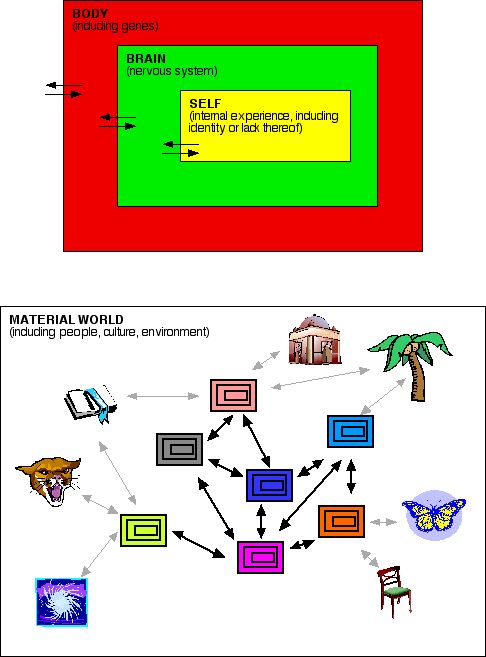
Neocortex=I-function=story teller?
Learning, memory, and ... becoming
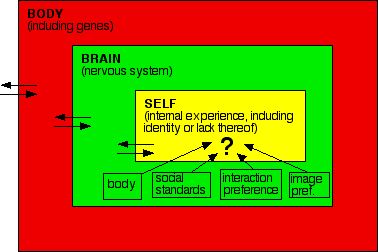

|
The Brain - is wider than the Sky - For - put them side by side - The one the other will contain With ease - and You - beside-
| 
|
Trust where you are at any given time | 
|
|
|
 Leave final thoughts in forum area
Leave final thoughts in forum area
Keep me posted on your exploring
Happy to have collaborators
To be continued
| Course Home Page
| Course Forum | Brain and
Behavior | Serendip Home |